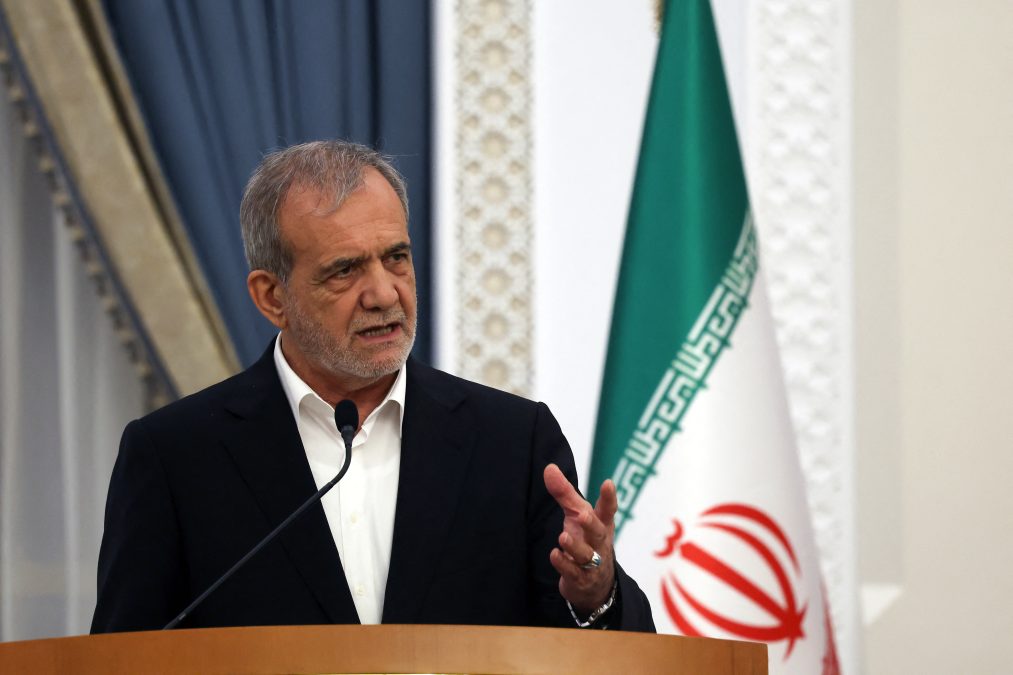Washington/Beirut/Tehran — US President Joe Biden said he was discussing possible Israeli strikes on Iranian oil facilities, in comments that sent oil prices spiking Thursday just a month before the US presidential election.
Biden told reporters at the White House however that he was not expecting Israel to launch any retaliation for Tehran’s missile barrage on Israel before Thursday at least.
When asked by a reporter if he supported Israel striking Iran’s oil facilities, Biden said “we’re discussing that. I think that would be a little… anyway.”
Oil prices jumped five percent over concerns about the Middle East after Biden spoke. WTI, the US contract, rose by as much as five percent before paring back some gains to sit at around $73 per barrel while Brent, the international benchmark, rose around four percent to $76.81.
A rise in oil prices could be hugely damaging for Biden’s Vice President Kamala Harris as the Democrat confronts Republican former president Donald Trump in a November 5 election where the cost of living is a major issue.
Biden said he did not expect any immediate action from Israel — even if Israeli Prime Minister Benjamin Netanyahu has recently paid little heed to calls for restraint as he targets the Iran-allied Hezbollah militia in Lebanon.
“First of all, we don’t ‘allow’ Israel, we advise Israel. And there is nothing going to happen today,” Biden told reporters when asked if he would allow Israel to retaliate against Iran.
Biden said on Wednesday that he would not back Israel attacking Iranian nuclear sites.
Also, Biden said he did not believe any Israeli strikes against Iran would come on Thursday, as the region tensely awaits a response to Tehran’s massive missile attack on Israel.
Iran launched around 200 rockets in a direct missile attack on Israel on Tuesday, prompting Netanyahu to warn that Tehran would pay.
Iran said it was in retaliation for the killing of Hassan Nasrallah, the leader of Hezbollah.
Hezbollah has been launching rockets at Israel since shortly after the October 7, 2023 attacks on Israel by Iran’s Palestinian ally Hamas, and Israel’s crushing retaliatory offensive in Gaza.
Media reports citing news agency Reuters said that oil-rich GCC Arab states – Bahrain, Kuwait, Oman, Qatar, Saudi Arabia, and United Arab Emirates – have reassured Iran of their neutrality in the conflict between Tehran and Israel in meetings in Doha this week.

Ministers from Gulf Arab states and Iran attending a meeting of Asian nations hosted by Qatar centered their conversations around de-escalation, said media reports quoting Reuters.
In Beirut, Lebanon’s army said it returned Israeli fire for the first time Thursday in nearly a year of fighting between Israel and Hezbollah, after a second soldier was killed by Israeli fire in a day.
“A soldier was killed after the Israeli enemy targeted an army post in the Bint Jbeil area — in the south, and the personnel at the post responded to the sources of fire,” the army said in a statement.
A military official, requesting anonymity to discuss sensitive matters, told AFP this was the first response to Israeli fire since last October because the post had been “directly” hit.
It was the third such killing of a Lebanese soldier since the start of the escalation between the Iran-backed group and Israel on September 23.
Earlier Thursday, the army had said “a soldier was killed and another was wounded as a result of an aggression by the Israeli enemy during an evacuation and rescue operation with the Lebanese Red Cross in Taybeh village”.
The Lebanese Red Cross said four of its volunteers were wounded.
Hezbollah earlier said it fought off three bids by the Israeli army to infiltrate Lebanese territory, including one not far from Taybeh.
The Iran-backed militant group said it “repelled with artillery fire an attempt by enemy Israeli forces to advance at Fatima’s Gate” — a point on the cement and barbed wire wall running along the border.
Hezbollah also said it set off “four explosive devices” against Israeli ground forces attempting to “infiltrate” near the towns of Maroun al-Ras and Yaroun.
It said it fired a barrage of rockets including at the Israeli city of Tiberias and a base for military industries in the Acre area, in response to the Israeli bombardment of Lebanese “towns, villages and civilians”.
On Monday, a Lebanese soldier was killed in an Israeli strike targeting a motorcycle at a checkpoint in the Wazzani area.
In Tehran, Iran summoned the German and Austrian ambassadors on Thursday after their governments rebuked the Islamic Republic over its missile attack on Israel, state media reported.
The move, according to the official IRNA news agency, was in response to the “unacceptable measures” by Germany and Austria in summoning the Iranian envoys over Iran’s attack on Tuesday.
Iran’s foreign ministry said in a statement that the attack was a “legitimate, responsible and effective response in punishing the aggressor Zionist regime (Israel)”.
Also on Thursday, foreign ministry spokesman Esmail Baghaei, condemned what he called “the continued biased and irresponsible approach” of the G7 group after it criticized the attack on Israel.
He also condemned the group’s call for further sanctions against Tehran, saying the attack was a “necessary response” to Israel’s “aggressive actions”.








